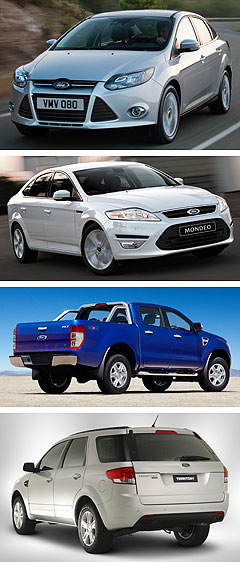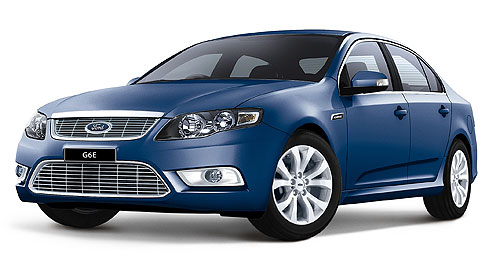Future models - Ford - Falcon - EcoLPiFirst details: Ford Falcon EcoLPiLPG Falcon: Ford's new EcoLPi engine has impressive performance and efficiency figures, and will make its debut mid-year. Ford reveals first details on Falcon’s next-generation ‘EcoLPi’ dedicated LPG system4 Apr 2011 FORD Australia has signalled its intention to promote the benefits of LPG power more seriously than ever before by announcing outstanding performance and efficiency details of the advanced new liquid-injection LPG system that will soon become available in the Falcon. GoAuto revealed two weeks ago the Falcon’s next-generation LPG system would go on sale earlier than expected in July, and now Ford has confirmed a mid-year release for the all-new dedicated LPG system, which will be called ‘EcoLPi’. The ground-breaking new liquid phase injection system, which will beat the Holden Commodore’s new LPG system to market, sees Ford continue as the only manufacturer to offer dedicated LPG vehicle technology in Australia. Ford’s new LPG powertrain will be available on an expanded range of Falcon sedan and ute models. Differentiated by new ‘EcoLPi’ badging, they will include XT, G6, G6E and XR6 sedan variants, and XL, R6 and XR6 ute variants in both Cab Chassis and Styleside body configurations. The launch of Falcon EcoLPi models in July will be followed by a facelifted 2012 Falcon range by October and the first four-cylinder Falcon – powered by an imported 2.0-litre turbo-petrol EcoBoost engine – by next February. Before then, Ford will also launch all-new Focus and Ranger models, a heavily upgraded Territory with diesel power and a facelifted Mondeo with a lower-output 2.0-litre EcoBoost engine. Ford claims its state-of-the-art EcoLPi engine, which will be produced alongside the Falcon’s and Territory’s 4.0-litre inline petrol sixes at Geelong, employs the most advanced LPG injection technology currently available to eliminate one the biggest compromises traditionally associated with LPG power – loss of performance. In fact, Ford claims its upcoming Falcon EcoLPi models will deliver more performance than the current inline six does when running on regular (91 RON) unleaded petrol, with 198kW of power available at 5000rpm and 409Nm of torque on tap at 3250rpm.  From top: Ford's local range will get a shake-up with new or upgraded Focus, Mondeo, Ranger and Territory models. From top: Ford's local range will get a shake-up with new or upgraded Focus, Mondeo, Ranger and Territory models.That matches the outputs of the Falcon’s I6 petrol engine on higher-octane 95 RON petrol and represents a significant 27 per cent improvement in maximum power and a 10 per cent lift in peak torque compared to the venturi-style vapour system used by the Falcon’s previous E-Gas LPG engine, which produced 156kW and 371Nm. At the same time, while official ADR 81/02 fuel consumption certification testing is yet to be completed, Ford says preliminary testing shows the EcoLPi system has the potential to slash fuel consumption – another traditional disadvantage of LPG engines – by between 12 and 15 per cent. That means there will also be a corresponding reduction in CO2 emissions, which for LPG vehicles are already traditionally up to 13 per cent lower than a comparable petrol vehicle. While the outgoing E-Gas LPG system consumes 14.9L/100km in the Falcon sedan (well up on the equivalent petrol model’s 9.9L/100km), that should mean the Falcon EcoLPi sedan should return fuel economy in the mid- to high-12L/100km range. Coupled with the traditionally low price of automotive LPG in Australia – where it costs about half as much as petrol but is currently scheduled to attract federal government fuel excise of at least 2.5 cents per litre for the first time from December – that should spell significant running cost reductions for both fleet and private Falcon users. Of course, unlike dual-fuel LPG systems such as the Commodore’s, Ford latest dedicated LPG system continues to eliminate the need for a second space-robbing fuel tank. Ford has offered an LPG option in its Falcon for more than a decade, with more than 100,000 LPG-powered models produced since a dedicated LPG system was first introduced in mid-2000, making it one of Australia’s leading alternative fuel vehicle suppliers. As we reported recently, however, sales of LPG passenger vehicles to business customers slumped by 21.2 per cent to just 4669 last year, while private LPG vehicle sales were static at a staggering low of just 288. Non-private sales of LPG-fuelled light commercial vehicles were down an even bigger 31.3 per cent to just 2680, while only 317 private buyers bought LPG-powered light commercials in 2011. With the E-Gas Falcon currently out of production, LPG vehicle sales have slumped even further this year, but Ford hopes its new ground-breaking EcoLPi system will change all that. “The introduction of EcoLPi is the next step in Ford Australia’s comprehensive new product offensive, which will see close to 85 per cent of our vehicle line-up all-new or significantly updated over the next 12 months,” said Ford Australia president and CEO Bob Graziano. “It also represents another key pillar in Ford’s plan to bring a range of sustainability initiatives to market, following the launch of Australia’s first locally-produced diesel vehicle with the new SZ Territory, as well as the introduction of Ford’s patented EcoBoost engine technology on Mondeo. “Awareness of the climate change issue and its importance to consumers has seen Ford deliver a range of product actions in recent years, which have introduced sustainable technologies that are conscious of both the environment and our customers. “Improvements in fuel economy, CO2 emissions and cost of ownership have been achieved through a combination of engineering developments, the introduction of a new range of small and light cars, and the expanded availability of alternative fuel vehicles such as diesel and LPG. “LPG is an alternative fuel that is readily available almost anywhere in Australia and provides real benefits for Australian consumers, with reduced fuel costs contributing to a significant improvement in cost of ownership. “Falcon EcoLPi offers customers the power, torque and overall engine performance they expect from a traditional Aussie six, coupled with all the space, comfort and towing capability of a family sedan, while at the same time delivering the fuel costs of a smaller car.” Fundamental to the Falcon’s fresh EcoLPi engine is its new fuel-injection system co-developed with Orbital, which is now similar to the I6 petrol engine’s in that it employs a new injector-based, high-pressure fuel rail to deliver liquid-state LPG fuel directly into the intake port. While traditional vapour LPG systems turn liquefied gas into vapour before feeding it into the engine via a venturi in the throttle body, liquid injection systems – as already seen in some aftermarket applications – send gas in a liquid state to the injectors. More precise injection of liquid LPG fuel directly into the intake port improves the engine’s volumetric efficiency. Because the LPG fuel is no longer under pressure once it is released from the injector, its sudden expansion and rapid cooling of the incoming air charge improves combustion efficiency, resulting in better fuel economy, reduced CO2 emissions and greater engine performance. The Falcon’s new EcoLPi system comprises a new fuel rail – including injectors – designed and developed specifically for Ford, plus new lightweight pistons, including a low-friction ring pack. Compression is increased to 12.0:1 to improve engine thermal efficiency and fuel consumption, new polymer fuel lines with a low thermal mass are designed to keep the LPG fuel liquefied, and a new fuel line filter and in-tank filter are added to prevent system component contamination. There are also significant modifications to the fuel tank, including all-new internals and sub-level components, as well as a new high-pressure fuel pump, while a new catalytic converter is now common with the petrol I6. Rounding out the changes are major calibration and engine management system modifications, including a new fuel priming strategy, and the fitment of the six-speed ZF automatic transmission from other models across the entire EcoLPi range, banishing the four-speed DSI auto from Ford’s Falcon line-up for good.  Read moreAll future models Alfa Romeo Alfa Romeo Abarth Abarth Audi Audi Aston Martin Aston Martin BMW BMW Bentley Bentley Chrysler Chrysler Chevrolet Chevrolet Dodge Dodge Citroen Citroen Ferrari Ferrari DS DS Ford Ford Fiat Fiat FPV FPV Foton Foton Haval Haval Great Wall Great Wall Honda Honda Holden Holden Hyundai Hyundai HSV HSV Isuzu Isuzu Infiniti Infiniti Jeep Jeep Jaguar Jaguar Lamborghini Lamborghini Kia Kia Lexus Lexus Land Rover Land Rover Mazda Mazda Maserati Maserati Mercedes-Benz Mercedes-Benz McLaren McLaren Mini Mini Nissan Nissan Mitsubishi Mitsubishi Peugeot Peugeot Opel Opel Proton Proton Porsche Porsche Renault Renault Ram Ram Saab Saab Rolls-Royce Rolls-Royce Smart Smart Skoda Skoda Subaru Subaru SsangYong SsangYong Tesla Tesla Suzuki Suzuki Toyota Toyota Volvo VolvoMotor industry news |
Click to shareFord modelsResearch Ford All future models Alfa Romeo Alfa Romeo Abarth Abarth Audi Audi Aston Martin Aston Martin BMW BMW Bentley Bentley Chrysler Chrysler Chevrolet Chevrolet Dodge Dodge Citroen Citroen Ferrari Ferrari DS DS Ford Ford Fiat Fiat FPV FPV Foton Foton Haval Haval Great Wall Great Wall Honda Honda Holden Holden Hyundai Hyundai HSV HSV Isuzu Isuzu Infiniti Infiniti Jeep Jeep Jaguar Jaguar Lamborghini Lamborghini Kia Kia Lexus Lexus Land Rover Land Rover Mazda Mazda Maserati Maserati Mercedes-Benz Mercedes-Benz McLaren McLaren Mini Mini Nissan Nissan Mitsubishi Mitsubishi Peugeot Peugeot Opel Opel Proton Proton Porsche Porsche Renault Renault Ram Ram Saab Saab Rolls-Royce Rolls-Royce Smart Smart Skoda Skoda Subaru Subaru SsangYong SsangYong Tesla Tesla Suzuki Suzuki Toyota Toyota Volvo VolvoMotor industry news |
















Facebook Twitter Instagram